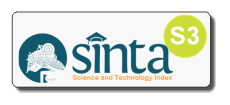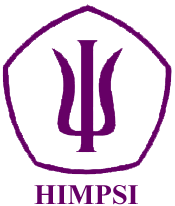The Effect of Students’ Resiliency and Self-Efficacy on Academic Stress During the Transition Period from Online to Offline Learning
Abstract
Full Text:
PDFReferences
Addini, S. E., Syahidah, B. D., Putri, B. A., & Setyowibowo, H. (2022). Kesehatan Mental Siswa SMP-SMA Indonesia Selama Masa Pandemi dan Faktor Penyebabnya. Psychopolytan: Jurnal Psikologi, 5(2), 107–116. https://doi.org/10.36341/psi.v5i2.2134
Alidosti, M., Delaram, M., Dehgani, L., & Maleki Moghadam, M. (2016). Relationship Between Self-Efficacy and Burnout Among Nurses in Behbahan City, Iran. Women’s Health Bulletin, 3(4), 1–5. https://doi.org/10.17795/whb-30445
Alvin. (2007). Stres Akademik. Jakarta: PT Raja.
Andeslan, S., & Uyun, Q. (2023). Hubungan Antara Rasa Syukur terhadap Tingkat Depresi, Cemas, Stres pada Mahasiswa Tingkat Akhir di Masa Peralihan Pandemi Covid-19. Cakrawala Repositori IMWI, 6(1), 681–690. https://doi.org/10.52851/cakrawala.v6i1.259
Atziza, R. (2015). Faktor-Faktor yang Mempengaruhi Kejadian Stres dalam Pendidikan Kedokteran. Jurnal Agromedicine, 2(3), 317–320.
Bandura, A. (1994). Self-Efficacy. In V. S. Ramachaudran (Ed.), Encyclopedia of Human Behavior (Vol. 4, pp. 71–81). New York: Academia Press.
Carolina, N., Azizah, S. N., Sholihah, L. M. N., Rosyidah, U., & Purwanti, P. (2022). Analisis Pengaruh Transisi Pembelajaran Jarak Jauh ke Pembelajaran Tatap Muka terhadap Kesehatan Mental Pelajar Pasca Pandemi Covid-19. Seminar Nasional Psikologi UAD, 1(1). Retrieved from http://seminar.uad.ac.id/index.php/SNFP/article/view/9598
Cassidy, S. (2016). The Academic Resilience Scale (ARS-30): A New Multidimensional Construct Measure. Frontiers in Psychology, 7, 1787. https://doi.org/10.3389/fpsyg.2016.01787
Darmayanti, K. K. H., Anggraini, E., Winata, E. Y., & Mardianto, M. F. F. (2021). Confirmatory Factor Analysis of the Academic Self-Efficacy Scale: An Indonesian Version. Jurnal Pengukuran Psikologi dan Pendidikan Indonesia (JP3I), 10(2), 118–132.
Fitriansyah, F. (2022). Dinamika Pembelajaran Tatap Muka Terbatas di Kalangan Mahasiswa. Prima Magistra: Jurnal Ilmiah Kependidikan, 3(1), 123–130. https://doi.org/10.37478/jpm.v3i1.1438
Gadzella, B. M. (1994). Student-Life Stress Inventory: Identification of and Reactions to Stressors. Psychological Reports, 74(2), 395–402. https://doi.org/10.2466/pr0.1994.74.2.395
Hardiansyah, M. A., Ramadhan, I., Suriyanisa, S., Pratiwi, B., Kusumayanti, N., & Yeni, Y. (2021). Analisis Perubahan Sistem Pelaksanaan Pembelajaran Daring ke Luring pada Masa Pandemi Covid-19 di SMP. Jurnal Basicedu, 5(6), 5840–5852. https://doi.org/10.31004/basicedu.v5i6.1784
Jowkar, B., Kojuri, J., Kohoulat, N., & Hayat, A. A. (2014). Academic Resilience in Education: The Role of Achievement Goal Orientations. Journal of Advances in Medical Education & Professionalism, 2(1), 33–38.
Kirana, A., Agustini, A., & Rista, E. (2022). Resiliensi dan Stres Akademik Mahasiswa yang Sedang Menyelesaikan Skripsi di Universitas X Jakarta Barat. Provitae: Jurnal Psikologi Pendidikan, 15(1), 27–50. https://doi.org/10.24912/provitae.v15i1.18379
Lin, Y. M., & Chen, F. S. (2009). Academic Stress Inventory of Students at Universities and Colleges of Technology. World Transactions on Engineering and Technology Education, 7(2), 157–162.
Lubis, H., Ramadhani, A., & Rasyid, M. (2021). Stres Akademik Mahasiswa dalam Melaksanakan Kuliah Daring Selama Masa Pandemi Covid 19. Psikostudia: Jurnal Psikologi, 10(1), 31–39. https://doi.org/10.30872/psikostudia.v10i1.5454
MonicaSari, D. (2022, May 28). Bagaimana Tanggapan Mahasiswa Mengenai Peralihan Perkuliahan Online ke Offline. Kompasiana. Retrieved from https://www.kompasiana.com/diazmonicasari/6292510cbb44862e8f671933/bagaimana-tanggapan-mahasiswa-mengenai-peralihan-perkuliahan-online-ke-offline
Nist-Olejnik, S., & Holschuh, J. P. (2016). College Rules!: How to Study, Survive, and Succeed in College (4th ed.). Berkeley: Ten Speed Press.
Puspitaningrum, N. P. P., & Pudjiati, S. R. R. (2021). Peran Resource dan Vulnerability Index of Resilience terhadap Distres Psikologis Remaja Saat Pandemi COVID-19. Jurnal Ilmiah Psikologi Terapan, 9(2), 156–163. https://doi.org/10.22219/jipt.v9i2.14265
Puteri, I. A. W., & Syafrina, R. (2022). Hubungan Antara Academic Self-Efficacy dan Resiliensi Akademik pada Mahasiswa Pendidikan Guru PAUD di Masa Pandemi Covid-19. Sistema: Jurnal Pendidikan, 3(1), 65–71.
Rahayu, E. W., & Djabbar, M. E. A. (2019). Peran Resiliensi terhadap Stres Akademik Siswa SMA. Naskah Prosiding Temilnas XI IPPI (Malang, 20-21 September 2019), 216–224. Malang: Psychology Forum. Retrieved from https://psychologyforum.umm.ac.id/files/file/Prosiding%20IPPI%202019/25_%20Naskah%20-216-224.pdf
Risnawati, E., Arisandi, A., & Dawanti, R. (2019). Peran Religiusitas dan Psychological Well-Being terhadap Resiliensi Korban KDRT. Jurnal Ilmiah Psikologi MIND SET, 10(02), 67–77. https://doi.org/10.35814/mindset.v10i02.836
Sagone, E., & Caroli, M. E. D. (2014). Locus of Control and Academic Self-Efficacy in University Students: The Effects of Self-Concepts. Procedia - Social and Behavioral Sciences, 114, 222–228. https://doi.org/10.1016/j.sbspro.2013.12.689
Sarafino, E. P. (2006). Health Psychology Biopsychosocial Interactions (5th ed.). Hoboken: John Wiley & Sons Inc.
Septiana, N. Z. (2021). Hubungan Antara Stres Akademik dan Resiliensi Akademik Siswa Sekolah Dasar di Masa Pandemi COVID-19. SITTAH: Journal of Primary Education, 2(1), 49–64. https://doi.org/10.30762/sittah.v2i1.2915
Septiani, T., & Fitria, N. (2016). Hubungan Antara Resiliensi dengan Stres pada Mahasiswa Sekolah Tinggi Kedinasan. Jurnal Penelitian Psikologi, 7(2), 59–76.
Siregar, I. K., & Putri, S. R. (2020). Hubungan Self-Efficacy dan Stres Akademik Mahasiswa. Consilium: Berkala Kajian Konseling dan Ilmu Keagamaan, 6(2), 91–95. https://doi.org/10.37064/consilium.v6i2.6386
Sugiyono. (2013). Metode Penelitian Kuantitatif, Kualitatif, dan R&D. Bandung: Alfabeta.
Syaiful, I. A. & Dearly. (2015). Program Peningkatan Resiliensi Bagi Pecandu Narkoba: Pendekatan Riset Tindakan Berbasis Kualitatif. Jurnal Intervensi Psikologi (JIP), 7(1), 116–129. https://doi.org/10.20885/intervensipsikologi.vol7.iss1.art7
Tasalim, R., & Cahyani, A. R. (2021). Stres Akademik dan Penanganannya. Bogor: Guepedia.
Ulfa, S., & Aprianti, M. (2021). Pengaruh Efikasi Diri terhadap Burnout dan Perbedaannya Berdasarkan Gender. Psychosophia: Journal of Psychology, Religion, and Humanity, 3(1), 24–35. https://doi.org/10.32923/psc.v3i1.1651
Wulandari, W., & Kumalasari, D. (2022). Resiliensi Akademik pada Mahasiswa: Bagaimana Kaitannya dengan Dukungan Dosen? Jurnal Psikologi Malahayati, 4(1), 19–30. https://doi.org/10.33024/jpm.v4i1.5058
Zhang, J., Yang, Z., Wang, X., Li, J., Dong, L., Wang, F., … Zhang, J. (2020). The Relationship Between Resilience, Anxiety and Depression Among Patients With Mild Symptoms of COVID-19 in China: A Cross-Sectional Study. Journal of Clinical Nursing, 29(21–22), 4020–4029. https://doi.org/10.1111/jocn.15425
DOI: http://dx.doi.org/10.17977/um023v13i12024p64-73
Refbacks
- There are currently no refbacks.
Copyright (c) 2024 Jurnal Sains Psikologi

This work is licensed under a Creative Commons Attribution 4.0 International License.
Reference Manager :
|
Aliansi:
Plagiarism Checker :
This work is licensed under a Creative Commons Attribution 4.0 International License.



1.png)








